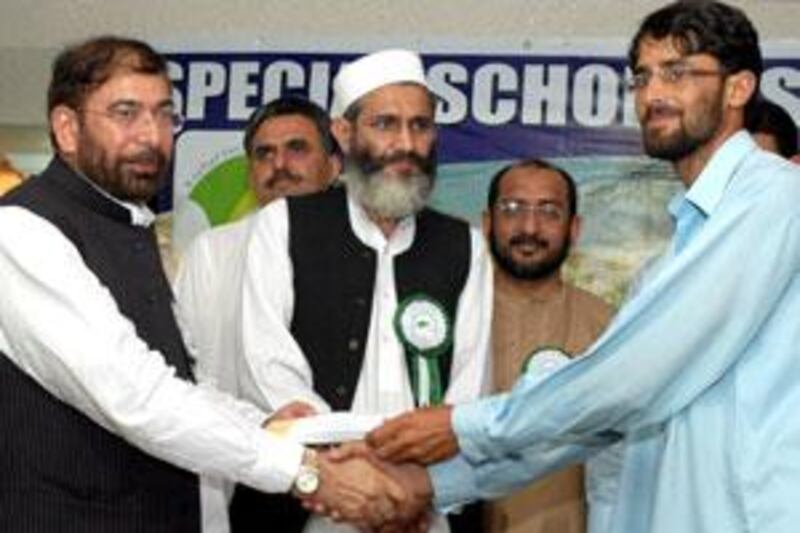PESHWAR, PAKISTAN // A group of Pakistani philanthropists based in the UAE is in Pakistan to oversee the distribution of aid to people who have fled fighting between militants and security forces. The Pakistan Association Dubai (PAD) is involved in the collection of relief goods and cash for the more than two million people displaced over the past two months.
Taliban militants have resurfaced to inflict violence and intimidate residents in northern Pakistan as hundreds of thousands of people start returning to their homes following the end of major military operations. The violence shows security remains fragile in the north-west despite the fact that on Monday the government officially closed two camps near the city of Mardan that had housed about 20,000 people.
A delegation from PAD this week started to distribute relief goods in the camps in Peshawar, Malakand, Mardan, Swabi and Nowshehra in north-western Pakistan. "Generous support from the Pakistani community in Dubai enabled us to provide a substantial relief to the affected people," said the PAD secretary general, Muhammad Khaleeq. The group has managed to work alongside one of Pakistan's largest Islamic relief organisations, al Khidmat, in many of the major camps, reaching about 7,000 affected families.
The work of one man in PAD, Shah Hussain, in particular stands out. Mr Hussain, who comes from the insurgency-troubled North West Frontier Province (NWFP), travelled to Pakistan from the UAE six weeks ago to give hands-on support and plans to remain for several more weeks. He has managed to fill in some of the gaps left by major relief organisations by seeking out those residents - the vast majority - who sought refuge not in camps but in private houses.
"I visited all the camps and got to know what was needed," said Mr Hussain, who owns a transport and luxury car rental business in Abu Dhabi, where he has lived for 42 years. PAD raised about 12 million rupees (Dh536,000) to provide relief and has sent six containers of medicines, food, toys and bedding to the camps. There are about one million Pakistanis living in the UAE. "We have our own system for welfare and so we decided to club together to help to remedy this bad situation," said Riaz Farooq, PAD's chairman.
The group has also set up a clinic in the area of military operations in Thana in Dir. The clinic is staffed with doctors, an X-ray machine and a basic laboratory. Mr Hussain visited a village outside the town of Takht Bhai in Mardan district where he saw 160 people sitting under a tree. Thinking that he was witnessing a marriage or funeral Mr Hussain approached the large gathering to ask what was happening.
The man who answered him, a local farmer, said that the 160 were displaced people who were his guests. "We gave him food packages continuously and regularly as initially he had thought his guests would stay for 10 days, not a question of months. He needed our help," said Mr Hussain, during an interview in Peshawar. He also distributed 28 sewing machines to women "so that they might work and earn a living".
Mr Hussain extended the group's reach to areas untouched by most relief agencies. They included the southern areas of NWFP such as Kohat and Bannu, where people from Malakand had also sought refuge. When Mr Hussain was in Peshawar, NWFP's capital, he came to learn of the plight of students from the Swat valley and other affected areas. The group is co-operating with Peshawar University to provide basic relief goods to the 1,050 students it has taken on from the affected areas.
As a start-up measure, PAD handed out 200 "scholarships" worth 3,000 rupees each this week. "We learnt that many of the students are not asking for help because they are shy; some students had not eaten for three days," said Mr Farooq. "Next week we will distribute more funds to students. Our priority is those wounded in the fighting; some of the female students have bullet wounds," said Mr Hussain.
He added that because local culture tended to neglect women's' education, his group would make an effort to ensure that female students received financial assistance. The group has now registered itself as a charitable organisation in Pakistan, called PAD Relief. "We want to invite overseas Pakistanis to contribute funds for projects to help our countrymen here," said Mr Farooq. PAD Relief's executive chairman, Naveed Anwar, pointed out that long-term help is needed for those affected by the fighting.
"In our culture, female students are discouraged, but those who have witnessed the fighting now have extra hurdles. One report estimates that 20 per cent may need psychological therapy," he said. Mr Farooq, who as a student in Pakistan was affiliated with the religious party Jamaat-i-Islam, said that during his university days he discovered the importance of helping others.His political view was that the fighting in Pakistan was a product of America's presence in neighbouring Afghanistan.
"The operation [against the militants] should not have happened. It should be finished as soon as possible," he said. @Email:iwilkinson@thenational.ae






